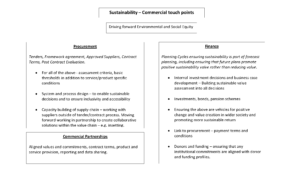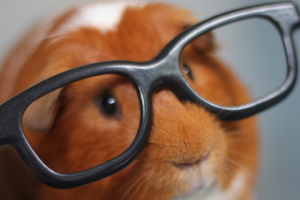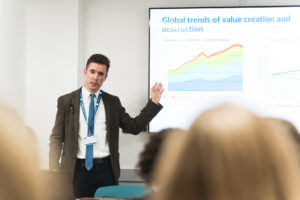
| Date | Author |
|---|---|
| 30th January 2023 | Dr Louise Ellis |
In 2022, strategic commercial leaders in finance, procurement and contract management met for SUMS’ first Commercial Community of Practice Group Meeting. The group is an opportunity to look to the future and to better understand the strategic drivers shaping our commercial activities. The session focused on sustainability. Here, Dr Louise Ellis, former Director of Sustainability at the University of Leeds and current Trustee and Director at the EAUC, shares her initial suggestions for kick starting a whole systems approach.
Taking a systems approach to sustainability is fundamental if universities are to be truly sustainable and drive forward environmental and social equity. The approach stands on the assumption that breaking down a complex concept such as sustainability into simple easy to understand units helps us better understand the complexity.
To create sustainable universities which are effective and efficient, while fulfilling their intrinsic purpose to address the social challenges of the day, we must understand and operate universities as a whole system. No one part of the system can operate properly on its own and no one part of the system can be changed without affecting another. We must also recognise that the people within the system do not thrive within silos. Adoption of a systems approach – and putting the right enablers in place – is a fundamental prerequisite to success.
However, thinking about sustainability in its broadest sense and overlaying this on a whole university basis can feel overwhelming. People often ask, where do we start? Isn’t it easier to break it down into little chunks – seeing equality, diversity and inclusion as a very different thing to achieving net-zero carbon? The answer is not really; understanding the intersection of the issues allows more effective and efficient solutions to be developed and, more importantly, has a more positive impact and better outcomes.
While Procurement and Finance functions are some of key building blocks of the internal university system, they are also actively engaged and are components of the wider external system in which universities are located. They are integral enablers of a university’s sustainability strategy and its civic agenda, having direct social and environmental impact, being able to drive forward environmental and social equity.
So, Where Do You Start?
The best place to start when taking a whole systems approach is to think about where the biggest points of material impact are in the work that you do. This can be either the extent to which these points affect the way the university works, or the extent of the potential environmental and social impact of your activity. Let’s take a few examples:
- Business-case discussions –These discussions are happening now, but the associated impacts can last for many years. It is vital that the decision-making process has environmental and social sustainability at the core, along with financial sustainability. Business cases must have a sustainability strand that is assessed as a fundamental part of their evaluation.
- Investment portfolios – Likewise, the management of investment portfolios must algin with the values of the university, supporting the drive for equity beyond the boundaries of the institution. Your investment policy should include articulated sustainability criteria.
- Value chain of a university – This reaches far and wide, touching on social considerations, for example, modern slavery, inclusivity, social mobility, as well as the potential to create and degrade environmental value such as climate impacts, biodiversity and waste. Tenders and contract criteria must, substantively, incorporate social and environmental value. This should also extend to post-award evaluation. Your ongoing contract management should assess progress against sustainability as well as commercial performance.
These are just three examples. Within the university system, finance, procurement and commercial agreements have several interconnected touch points through which others can be enabled to act – but they also can directly lead to the growth of environmental and social equity.

As individuals, not all points of interconnectivity are in our direct control, but we must recognise how our actions influence them and that by taking a whole institutional approach, we can create a more sustainable university and drive forward wider environmental and social equity.
For more information on this and other strategic topics driving commercial practice, join SUMS’ Commercial Community of Practice Group (CCOP). This group is for strategic commercial leaders in finance, procurement and contract management including, Finance Directors, Deputy Directors of Finance and Procurement Directors, and those who have responsibility for driving organisational strategies such as directors of estates and sustainability. We’ve called it ‘Commercial’ to reflect the drivers from the Government to behave more commercially and the need to link university strategies to deliver the greatest value – going beyond the bounds of procurement to include whole university initiatives and activities. For more information on the Group and to join the mailing list, please email Linda Crotty at l.j.crotty@reading.ac.uk.








